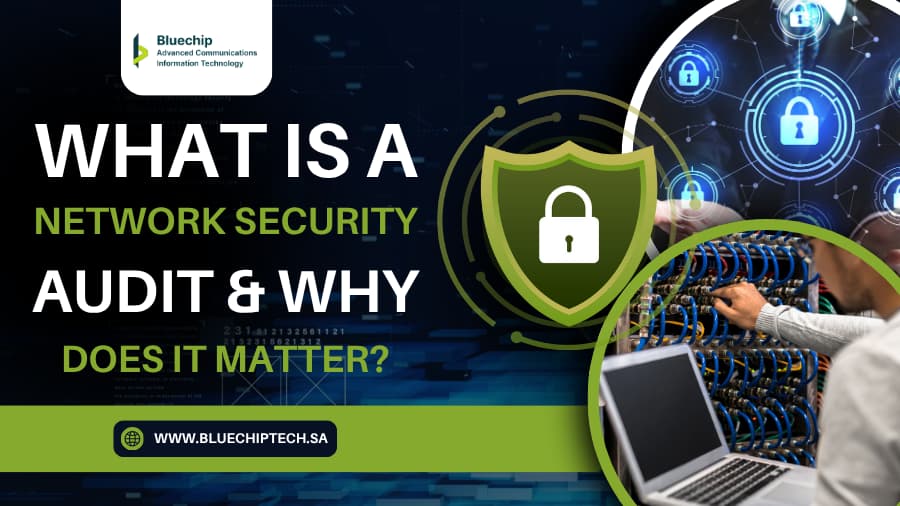
What Is a Network Security Audit & Why Does It Matter?
In today’s technical world, every business operates on its network. From sending an email to processing a payment, your network is the lifeblood of your corporation. But only like a heart requires routine check-ups, your network requires a complete protection evaluation. This crucial check-up is called a Network security audit. For companies, particularly in high-stakes environments such as the Middle East, making sure digital protection is crucial. Organizations looking for strong security in the Kingdom turn to professional cybersecurity services in Saudi Arabia for audits that deliver peace of mind.
What Exactly is a Network Security Audit?
Simply put, a network security audit is a profound, systematic inspection of the overall IT infrastructure of your company to locate weaknesses, dangers, and gaps in protection guidelines.

Consider it like a meticulous home check. You do not only check the doors; you check the wiring, the base, the roof, and the locks on every window. A network security audit does the same for your technology environment. It looks at three major locations –
1. Hardware & Software – Are your firewalls, servers, routers, and employee computers configured appropriately? Is all your software updated with the current protection patches?
2. Policies & Procedures – Are your rules for passwords, remote access, and managing sensitive data clear and being followed?
3. People – Are your workers skilled to locate and sidestep typical dangers such as phishing emails?
The objective is to answer one basic question: how well are you secured against a cyberattack or data breach?
Why Does This Audit Matter So Much?
In the existing threat landscape, where cyberattacks are continuously growing, depending on old protection standards is like utilizing a wooden door to prevent a tank. Routine audits are crucial for your business survival and success.
1. Uncover Hidden Vulnerabilities Before Hackers Do
The primary reason for an audit is a forceful defense. It is assured that your network has weak points; it is complicated, always transforming, and humans make mistakes.
- Misconfigurations – A small mistake in a firewall rule or server configuration can leave a large door open for hackers. An audit locates these technical errors.
- Outdated Software – Hackers love old software because it has popular weaknesses. The audit recognizes systems that require urgent updates.
- Weak Access Control – Do old workers still have network access? Do workers have more approvals than they require? An audit checks user rights to enforce the principle of least privilege, drastically decreasing internal threats.
2. Ensure Regulatory Compliance
Governments and sectors throughout the world have stringent regulations about how you should secure data.
- Avoiding Penalties – In locations such as Saudi Arabia, complying with national cybersecurity solutions, KSA norms, and global rules is compulsory. An audit confirms that your systems fulfill these demands, assisting you in avoiding huge penalties, which can financially cripple a corporation.
- Building Trust – Being capable of proving adherence is crucial for winning agreements and building faith with partners and clients who depend on your protection.
3. Strengthen Incident Response
A complete audit not only looks for holes; it tests how well your team can manage a crisis.
- Testing the Plan – What occurs the moment a breach is found? An audit can include tabletop exercises or simulations to test your incident response plan.
- Faster Recovery – Understanding your exposures, having a clear plan, and having the appropriate cybersecurity support in Saudi Arabia make sure you can rapidly respond to a breach, kick the attackers out, and get back to business with minimal downtime.
4. Optimize Security Spending
Protection is not free, but neither is a huge data breach. An audit assists you in spending your budget wisely.
- Prioritize Risks – The audit report transparently demonstrates which exposures pose the highest risk to your most effective assets. This permits prioritizing spending on the fixes that deliver the largest protection enhancement for your investment. Stop wasting money on equipment that does not solve your actual issues.
How is a Network Security Audit Performed?

A thorough audit entails a number of crucial procedures, frequently carried out by outside experts to provide an objective, knowledgeable perspective. Structured approaches are used by businesses seeking top-tier enterprise cybersecurity in Saudi Arabia.
Step 1 – Define the Scope – First, the auditors and your team decide what will be examined (e.g., the entire internal network, including employee laptops, or just the servers that are visible to the public).
Step 2 – Asset Inventory & Review – Every device, operating system, application, and cloud service is listed in the comprehensive network map that the auditors make. After that, they examine all current security guidelines, protocols, and records.
Step 3 – Vulnerability Assessment & Penetration Testing (VAPT)
The action phase is this –
- Vulnerability Scan – Automated tools check your systems for known configuration errors and vulnerabilities.
- Pen Test (Penetration Test) – Ethical hackers actively attempt to take advantage of the vulnerabilities discovered in the scan by simulating an actual attack. This is important because it demonstrates what a real attacker could do, not just what might be feasible.
Step 4 – Reporting and Analysis – All of the findings are compiled into a thorough report by the audit team. Every weakness is listed in this document along with its risk level (Low, Medium, High, or Critical) and the possible business impact.
Step 5 – Remediation and Follow-Up – Without action, the report is worthless. Your IT staff starts resolving the issues found, guided by the audit’s recommendations. The successful closure of the vulnerabilities is ensured by a final follow-up check.
The Bottom Line
An investment in your company’s continuity and reputation, a network security audit is not an expense. Knowing that your defenses are strong is a must in an era where digital threats pose the greatest threat to any organization.
By working with seasoned cybersecurity services Saudi Arabia providers, businesses operating in the Kingdom can be sure that their network audits are not only technically sound but also perfectly compliant with local regulations and international standards. Be proactive and safeguard your digital future now rather than waiting for a breach to uncover your vulnerabilities.






